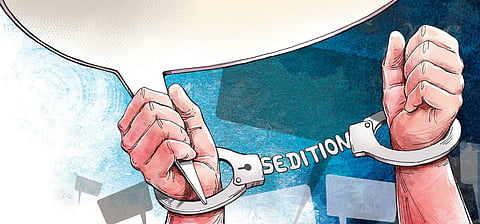

The Indian state seems to be at war with its own people. The cavalier and often selective use of the sedition law (Indian Penal Code, Section 124A) by the government to target citizens has multiple objectives: silence dissent, persecute and prosecute political adversaries, target independent journalists, authors, academics, and protect those who pledge support to the present regime.
The law of sedition is a relic of the colonial era. While sedition in England has been abolished through the Coroners and Justice Act, 2009, by the Gordon Brown government, it continues to hold sway here. India’s colonial undemocratic government was intolerant towards any form of dissent. Any word or deed calculated to disturb the tranquillity of the state was perceived as sedition (1868). Even holding a meeting or organising and conducting a procession was considered a seditious act. So was holding an opinion that bred hatred towards the government.
It is this law that was used against Mahatma Gandhi, Bal Gangadhar Tilak, Annie Besant, Maulana Azad, the Ali brothers and a host of other people opposing the might of the British empire. Gandhiji called sedition the “prince among the political sections of the IPC designed to suppress the liberty of the citizen”. The right to free speech and the right to peacefully protest are at the heart of human freedoms. Their legitimacy is reflected in them being recognised as unique fundamental rights, subject to reasonable restrictions that allows for legislation imposing restrictions on the exercise of these rights in the interest of sovereignty and integrity of India, security of the state or public order.
The Code of Criminal Procedure provides for imposing restrictions on the right to assemble peacefully without arms in the event of a threat to public order. Even free speech by individuals, organisations, associations or entities can be so restricted. However, the threshold for imposing restrictions must be such that there exists a clear and present danger to India’s sovereignty, security and integrity. It is in this sense that the law of sedition is anathema to our constitutional values and freedoms since the expressions used under it are in respect of acts that may have no relationship to a possible threat to the sovereignty and integrity of our nation.
In the Constituent Assembly, it goes to the credit of K M Munshi who moved an amendment to remove the word ‘sedition’ that was included in Article 13(2) of the Draft Constitution. The amendment was carried. Consequently, the present Article 19(2) does not refer to sedition, but seeks to impose restrictions if the sovereignty and integrity of India or the security of the state is threatened. Section 124A of the Indian Penal Code seeks to prosecute persons for sedition if their “words, either spoken or written, or by any signs, or by visible representation, or otherwise, brings or attempts to bring into hatred or contempt, or excites or attempts to excite disaffection towards the Government established by law”.
In other words, any manner of criticism, any form of protest, any words spoken or written that are harsh, contemptuous and attempt to excite disaffection towards the government established by law are perceived to be seditious acts. The content of Section 124A is ex facie violative of Article 19(1)(a) and (b) since none of these acts as contemplated in the sedition law can even remotely threaten the sovereignty and integrity of India. Besides, Article 19 refers to the state while Section 124A refers to the government. It is time for the Supreme Court to clarify the law.
The misuse of the sedition law has destroyed many lives. This is clearly reflected in the rate of conviction against those prosecuted. In 2019, 9% of the sedition cases pending from previous years and filed in 2019 resulted in closure because the accused were untraceable. Chargesheets were filed in only 17% of the cases. The conviction rate in such cases in 2019 was only 3.3%. That our government since 2014 has been misusing this law is evident from the fact that 96% of sedition cases against 405 persons for criticising politicians and governments were registered after 2014.
Since then, there has been a 28% spurt over previous years in the number of sedition cases filed. Around 65% of the 10,938 individuals accused of sedition since 2010 have been implicated during the present regime. According to the National Crime Records Bureau’s report, Crime in India, 93 cases of sedition were filed in 2019, which is a 165% jump from 35 in 2016. The state of Uttar Pradesh seems to be the most enthusiastic in this regard. Around 77% of the 195 sedition cases since 2010 were registered in the last four years since Yogi Adityanath became chief minister. More than half of these cases targeted those who protested against the Citizen (Amendment) Act, 2019.
The authoritarian streak of the present regime is apparent from the indiscriminate use of the law of sedition to shackle guaranteed fundamental freedoms without reasonable cause. This is reflected in India slipping from the 27th position in 2014 to the 53rd in 2020 in the Economist Intelligence Unit’s Democracy Index global ranking. In terms of press freedom too, India is ranked 142 out of 180 countries in the World Press Freedom Index 2020.
It is heartening to note that while the Supreme Court has chosen to wait and watch in matters of sedition, the subordinate judiciary has started questioning the misuse of sedition law. The prime minister raised the pitch when he said that Foreign Destructive Ideologies (FDI) is threatening our sovereignty and integrity. I might suggest to the prime minister that he must, when dealing with such FDIs, be more concerned and move against the Internal Destructive Forces (IDF) that seek to destabilise societal equanimity. They are the real threat to our Republic’s integrity.
Kapil Sibal (Tweets @KapilSibal)
Senior lawyer, Congress leader and member of Rajya Sabha